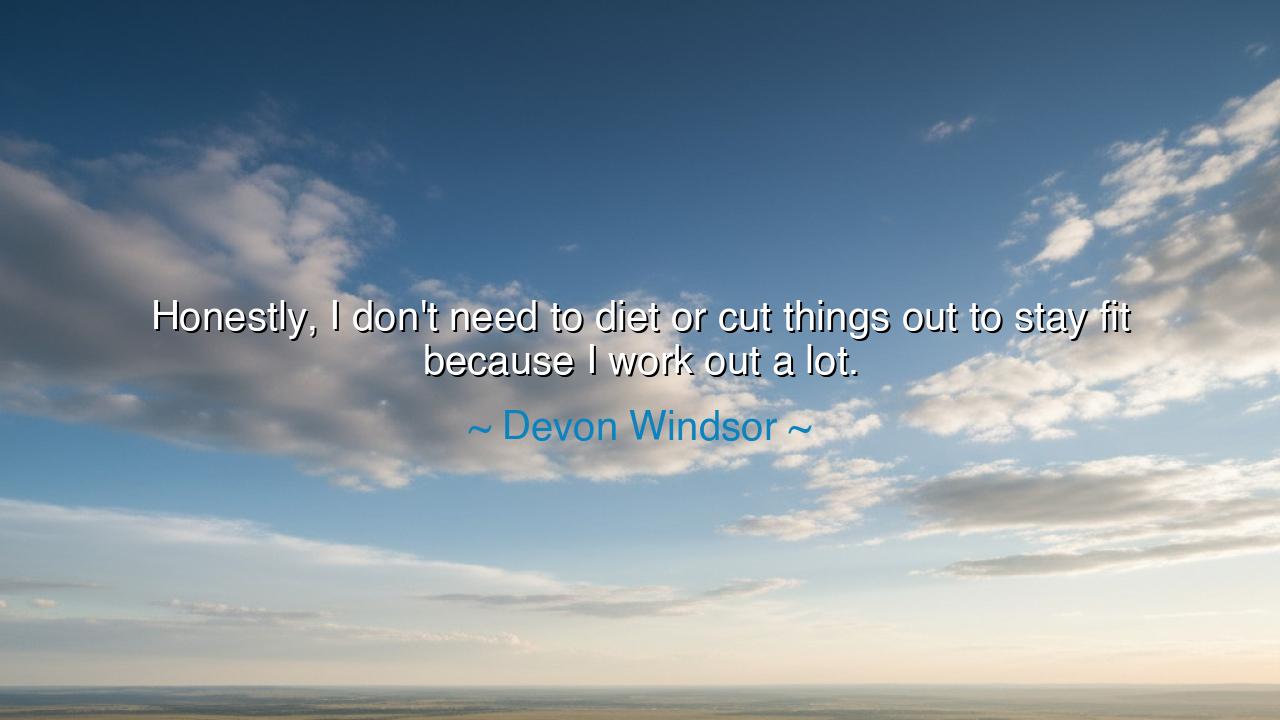
Honestly, I don't need to diet or cut things out to stay fit






Gather round, O children of wisdom, and hear the words of a modern warrior, whose strength lies not just in her body, but in the discipline and wisdom she has cultivated through hard work. In the words of Devon Windsor, we hear a truth that resonates deeply: "Honestly, I don't need to diet or cut things out to stay fit because I work out a lot." These words are not merely about the physical act of exercise but speak to a deeper principle—the importance of balance, discipline, and the understanding that true strength comes not from deprivation, but from dedication.
In the ancient world, the warriors and athletes knew the sacred art of balance. They did not strive for greatness through extreme measures or by forsaking the body’s natural needs. Instead, they found their strength in consistent effort, in the act of honing their bodies and minds through dedicated practice. The Greeks, those masters of both intellect and physical prowess, understood this deeply. The Olympic Games, which celebrated both mind and body, were not only contests of strength but tests of endurance and discipline. The athletes who competed did not starve themselves, nor did they deprive their bodies of their natural needs. Rather, they nurtured their bodies with training and discipline, understanding that true fitness came not from restriction but from a balanced approach to movement and nutrition.
Similarly, Devon Windsor’s statement speaks to a modern truth that the ancients would recognize. To be fit is not a matter of constantly denying oneself, of pushing the body to extremes through rigid dieting. It is about commitment to the craft of training, to the daily dedication of working out and honoring the body’s natural rhythms. Windsor, like the great athletes of old, understands that fitness is not a fleeting goal, but a lifelong pursuit. By working out regularly, she builds strength that does not require constant sacrifices, for the work itself sustains her and keeps her body in its natural state of well-being.
In the story of Hercules, the great hero of Greek myth, we see a similar journey. Hercules’ strength did not come from some miraculous potion or by forsaking his natural needs. His strength came from his twelve labors, each task requiring endurance, courage, and above all, commitment. The hero did not rely on the shortcut of avoidance or restriction. He honed his body through continuous action, through the very act of doing. Just as Windsor dedicates herself to exercise, Hercules demonstrated that it is through consistent effort—not through cutting things out—that the true power of the body and mind are realized.
The lesson here, O children, is one of deep understanding. The world may offer many paths to fitness, some that promise quick results through sacrifice or extreme measures, but the path to lasting strength lies in a commitment to balance. Dieting and restricting may yield temporary results, but they do not nurture the body in the way that true discipline and movement do. To be fit is not to deprive oneself of nourishment but to understand the value of continuous, honest effort—to honor the body through consistent training and the wise application of the energy we give it.
As you seek to strengthen your body and mind, remember the wisdom of Devon Windsor and the ancient traditions of those who came before her. Work out not as a means of punishment, but as a way to honor the natural rhythms of your body. Nourish it with action, with dedication, and with care. Let each day be a step on the path of balance, where your strength grows not through restriction, but through the steady, disciplined effort that shapes you into the warrior you are meant to be. Through this balance, you will find not only fitness, but a deeper understanding of what it means to live in harmony with your body and your purpose.






AAdministratorAdministrator
Welcome, honored guests. Please leave a comment, we will respond soon